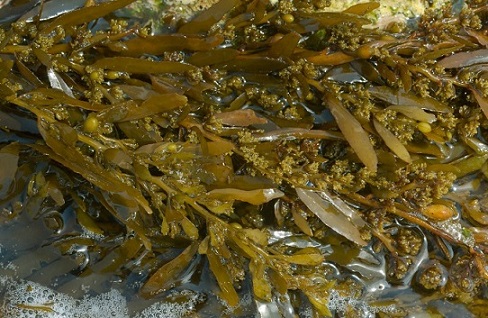Nikhil Prasad Fact checked by:Thailand Medical News Team May 15, 2025 8 months, 4 weeks, 2 days, 1 hour, 4 minutes ago
Medical News: Seaweed Antioxidant Shows Promise in Blocking Kidney Damage from Common Food Toxin
In a breakthrough that could change how we combat hidden food toxins, scientists from multiple institutions in Saudi Arabia and Egypt have uncovered the powerful protective potential of a marine phytochemical compound called fucoxanthin and its metabolite fucoxanthinol. These compounds, derived from brown seaweed, can effectively block kidney cell damage caused by a dangerous toxin called Ochratoxin A (OTA), which is commonly found in contaminated food products like cereals, coffee, dried fruits, and spices.
 Seaweed Compound Found to Protect Kidneys from Dangerous Food Toxins
Seaweed Compound Found to Protect Kidneys from Dangerous Food Toxins
The study, conducted by researchers from Northern Border University, King Abdulaziz University, Batterjee Medical College, Taibah University, and Mansoura University, focused on the effects of fucoxanthin and fucoxanthinol on OTA-induced kidney cell damage using human kidney cells known as HK-2. This
Medical News report unpacks how these natural compounds work to defend cells at a molecular level, offering a potential path to preventing serious kidney diseases.
The Hidden Threat in Our Food Supply
OTA is a mycotoxin produced by fungi that can contaminate food during storage. It is known to be toxic to multiple organs, but especially harmful to the kidneys. It causes DNA damage, mitochondrial dysfunction, oxidative stress, and even cell death through apoptosis. These effects are concerning because OTA is a probable human carcinogen and can be difficult to avoid in daily diets, especially in regions with poor food storage practices.
To test the defensive power of fucoxanthin and its metabolite, researchers exposed human kidney cells to OTA and evaluated several health markers. They discovered that OTA significantly disrupted cell energy production, damaged DNA, elevated oxidative stress levels, and triggered programmed cell death. However, when fucoxanthin or fucoxanthinol were introduced alongside OTA, the damage was dramatically reduced.
Key Protective Effects of Fucoxanthin and Its Metabolite
The researchers found that fucoxanthin and fucoxanthinol reversed the toxic effects of OTA in several important ways:
-
DNA Protection: OTA caused severe damage to the DNA in kidney cells, but both seaweed compounds helped restore DNA integrity, minimizing genetic injury.
-
Mitochondrial Support: These compounds boosted key mitochondrial functions—such as ATP production and membrane potential—essential for cell energy and survival.
-
Oxidative Stress Reduction: They significantly lowered harmful reactive oxygen
species (ROS) and lipid peroxidation levels while increasing antioxidant enzyme activities like catalase (CAT) and superoxide dismutase (SOD).
-
Gene Expression Normalization: Fucoxanthin and its metabolite improved the expressi
on of crucial mitochondrial genes (ND1, ND5, CO1, ATP6/8), indicating healthier cellular respiration and energy management.
-
Apoptosis Prevention: OTA triggered strong pro-apoptotic signals including elevated caspase levels and the Bax/Bcl-2 ratio. The seaweed compounds helped reverse these markers, reducing unnecessary cell death.
-
Mitophagy Regulation: OTA suppressed mitophagy, the process of removing damaged mitochondria, but both fucoxanthin and fucoxanthinol restored the expression of key proteins PINK1 and Parkin, allowing the cell to clean up and regenerate.
Stronger Protection at Higher Doses
The study also showed that fucoxanthinol (the metabolite) was more effective than fucoxanthin at equivalent doses, possibly because it is more bioavailable and easier for cells to absorb. Molecular docking simulations revealed that both compounds bind strongly to proteins involved in oxidative stress and mitochondrial function, further supporting their therapeutic potential.
A Promising Natural Strategy Against Kidney Damage
The research suggests that both fucoxanthin and fucoxanthinol may offer a safe, natural, and effective way to counteract OTA toxicity in human kidneys. Their broad protective abilities span across antioxidant, anti-inflammatory, genoprotective, and mitochondrial-stabilizing mechanisms. While this study was conducted in vitro (in lab-grown cells), it lays a strong foundation for future animal studies and eventually clinical trials.
Conclusion
This exciting research highlights how nature—specifically compounds found in marine algae—can provide potent tools to guard against harmful toxins hidden in our food supply. Fucoxanthin and fucoxanthinol demonstrated strong protection against OTA-induced kidney damage by targeting multiple cellular processes including oxidative stress, mitochondrial dysfunction, DNA damage, and cell death pathways. If further studies confirm these results in humans, fucoxanthin-based supplements could emerge as a powerful dietary defense against kidney-related diseases linked to food toxins.
The study findings were published on a preprint server and are currently being peer reviewed.
https://www.researchsquare.com/article/rs-6077785/v1
For the latest on Herbs and Phytochemicals, keep on logging to Thailand
Medical News.
Read Also:
https://www.thailandmedical.news/news/seaweed-polysaccharides-show-strong-promise-in-blocking-covid-19-virus-from-entering-cells
https://www.thailandmedical.news/news/iota-carrageenan-derived-from-red-seaweed-inhibits-human-metapneumovirus-hmpv-infections
https://www.thailandmedical.news/news/the-phytochemical-dieckol-from-ecklonia-cava-exhibits-antiviral-properties-against-the-zika-virus
https://www.thailandmedical.news/news/thailand-medical-researchers-study-seaweed-caulerpa-lentillifera-for-oral-cancer-treatments
https://www.thailandmedical.news/news/taiwanese-scientists-discover-beneficial-properties-of-red-algae-for-scar-prevention-and-skin-regeneration
https://www.thailandmedical.news/news/fucoidan-extract-shows-promise-for-gut-health-and-inflammation-control
https://www.thailandmedical.news/pages/thailand_doctors_listings
